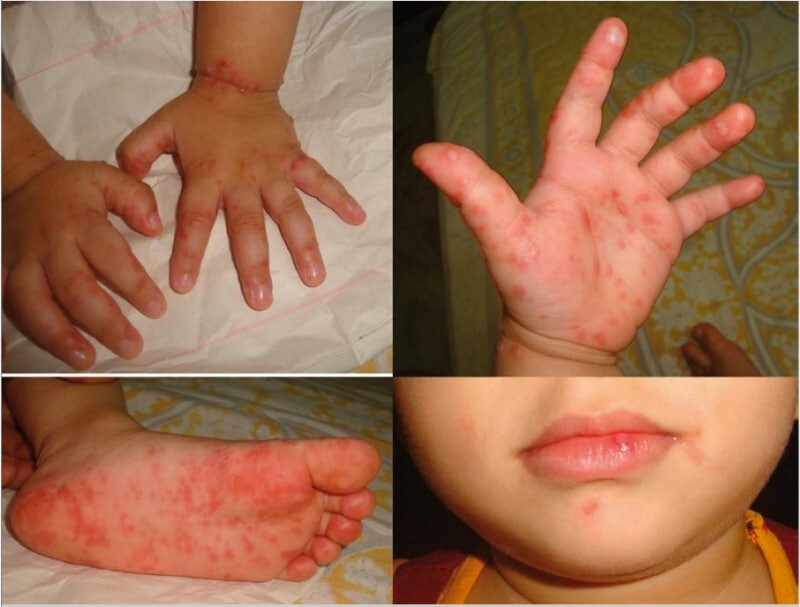
SEOUL – The Korea Disease Control and Prevention Agency (KDCA) has recently issued a public health warning regarding a notable increase in Hand-Foot-and-Mouth Disease (HFMD) cases, urging households with infants and young children, as well as relevant facilities, to strictly adhere to hygiene protocols.
The KDCA announced on June 27 that given HFMD's characteristic seasonal pattern—typically rising significantly from May and peaking between June and September—a continued increase in patient numbers is anticipated for the foreseeable future.
According to data from June 15-21, the incidence rate of HFMD stood at 5.8 cases per 1,000 outpatients, more than doubling from 2.7 cases in the preceding week. Particularly concerning is the prevalence among children aged 0-6 years, who showed a rate of 8.3 cases per 1,000 outpatients, significantly higher than the 1.9 cases observed in the 7-18 age group.
Understanding Hand-Foot-and-Mouth Disease
Hand-Foot-and-Mouth Disease is a common, highly contagious viral illness primarily caused by viruses belonging to the Enterovirus family, most notably Coxsackievirus A16 and Enterovirus 71 (EV-A71). Other strains, such as Coxsackievirus A6, can also cause the disease, sometimes leading to more severe symptoms. The infection typically spreads through direct contact with an infected person's bodily fluids, including stool, saliva, blister fluid, nasal mucus, or by touching contaminated objects and surfaces. It is important to note that HFMD is distinct from foot-and-mouth disease, which affects livestock, and humans cannot contract it from animals.
The incubation period for HFMD is usually 3 to 6 days. Initial symptoms often resemble the flu and can include a mild fever, sore throat, reduced appetite, and a general feeling of malaise. One to two days after the fever begins, characteristic painful mouth sores develop, typically on the tongue, gums, and inside of the cheeks. These start as small red spots that may blister. A distinctive rash, which is usually not itchy, then appears on the palms of the hands and soles of the feet. This rash can also manifest on the buttocks, elbows, knees, and sometimes other areas of the body, presenting as flat or slightly raised red spots, occasionally with blisters.
Complications and Treatment
While HFMD is generally a mild and self-limiting illness, resolving within 7 to 10 days, complications can occur, though rarely. Dehydration is the most common concern, particularly in young children who may refuse to drink due to painful mouth sores. In severe or atypical cases, especially those caused by EV-A71, serious neurological complications such as viral meningitis (inflammation of the membranes surrounding the brain and spinal cord) and encephalitis (brain inflammation) can arise. Other rare complications include myocarditis (inflammation of the heart muscle) and acute flaccid paralysis. Some individuals may also experience temporary nail loss weeks after recovery, with nails typically growing back.
Diagnosis is primarily clinical, based on the distinctive symptoms and rash. Laboratory tests, such as throat swabs or stool samples, may be conducted to identify the specific virus, especially in severe cases or during outbreaks. There is no specific antiviral treatment for HFMD. Management is largely supportive, focusing on relieving symptoms. Over-the-counter pain relievers like acetaminophen or ibuprofen can help manage fever and discomfort from mouth sores. Encouraging fluid intake is crucial to prevent dehydration, and soft, non-acidic foods can alleviate discomfort during eating. Patients should avoid aspirin, particularly in children.
Global Context and Prevention
HFMD is a global health concern, with outbreaks frequently observed worldwide. While temperate regions tend to see peaks during summer and early autumn, tropical regions may experience cases throughout the year. The Asia-Pacific region, including countries like China, Malaysia, Singapore, and Vietnam, has reported a significant burden of the disease and a higher incidence of severe cases associated with EV-A71.
Preventing the spread of HFMD hinges on stringent hygiene practices:
Handwashing: Frequent and thorough handwashing with soap and water for at least 20 seconds is paramount, especially after using the toilet, changing diapers, before and after meals, and after coughing or sneezing.
Avoid Close Contact: Individuals should avoid close contact such as kissing, hugging, or sharing eating utensils and cups with infected persons.
Disinfection: Regularly clean and disinfect frequently touched surfaces and shared items, including toys, doorknobs, and tables, particularly in childcare settings and homes with infected individuals. A solution of chlorine bleach can be used for disinfection after cleaning.
Isolation: Children exhibiting symptoms of HFMD should be kept home from daycare, preschool, or school until they have fully recovered, typically when fever has subsided and blisters have dried, to prevent further transmission.
Respiratory Etiquette: Practice good respiratory hygiene by covering coughs and sneezes with a tissue or elbow.
Director Ji Young-mi of the KDCA emphasized the importance of adhering to these prevention guidelines, particularly correct handwashing techniques. She further advised childcare facilities to maintain rigorous hygiene, including handwashing and disinfection of items, and to ensure that affected children only return to facilities after complete recovery. These measures are critical to curb the ongoing increase in HFMD cases and protect public health.
[Copyright (c) Global Economic Times. All Rights Reserved.]






























